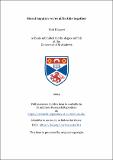Files in this item
Moral inquiry : we're all in this together
Item metadata
| dc.contributor.advisor | Snedegar, Justin | |
| dc.contributor.advisor | Brown, Jessica (Jessica Anne) | |
| dc.contributor.author | Küspert, Nick | |
| dc.coverage.spatial | 143 | en_US |
| dc.date.accessioned | 2024-03-06T14:56:17Z | |
| dc.date.available | 2024-03-06T14:56:17Z | |
| dc.date.issued | 2024-06-10 | |
| dc.identifier.uri | https://hdl.handle.net/10023/29446 | |
| dc.description.abstract | Moral inquiry is often thought of as an individualistic enterprise. This is in large part because morality not only seems to require doing the right thing, but being in touch with moral reality in the right way: to act well, it is necessary to ground our actions on an insight into moral reasons—reasons we can only understand when we inquire for ourselves. In this dissertation, I defend a picture of moral inquiry according to which such inquiry is fundamentally social: we are not alone when it comes to making moral decisions. In particular, I argue that the conception of moral inquiry as an individualistic enterprise wrongly delegitimises a central resource of moral inquiry, moral testimony. To this end, I first argue that moral agreement is of crucial justificatory value in moral inquiry. I then go on to address some worries connected to moral testimony, arguing that reliance on moral testimony is not intrinsically wrong and indeed oftentimes permissible if not required of us. I complement this with a discussion of moral expertise, arguing that the search for moral experts has often been too focused on theoretical knowledge. However, practical experience is a much more reliable way of identifying those we can rely on with respect to a particular moral issue. Lastly, I discuss one consequence this more social picture of moral inquiry has, namely that blame can not only be allocated to a wrongdoing agent, but also to those who guided the agent to that act. This concludes my contribution to the defence of a more social picture of moral inquiry. Overall, however, my aim is not to do away with the importance of being rightly connected to moral reality—it is just that the best connection to moral reality available is often not through ourselves, but through others. | en_US |
| dc.description.sponsorship | "Throughout my enrolment in the PhD programme at the University of St Andrews and the University of Stirling, I received a generous stipend from the Philosophical Quarterly as well as travel bursaries from the Department of Philosophy and the Arché Philosophical Research Centre here in St Andrews. My stay at Harvard University was possible only due to its fellowship programme. I am grateful to all of these institutions for considering my endeavour worthwhile enough for their support."--Acknowledgments | en |
| dc.language.iso | en | en_US |
| dc.relation | Küspert, N. (2023). Conciliating to avoid moral scepticism. International Journal of Philosophical Studies, 31(3), 279-300. https://doi.org/10.1080/09672559.2023.2263708 | en |
| dc.relation.uri | https://doi.org/10.1080/09672559.2023.2263708 | |
| dc.subject | Moral epistemology | en_US |
| dc.subject | Social epistemology | en_US |
| dc.subject | Moral testimony | en_US |
| dc.subject | Testimony | en_US |
| dc.subject | Moral experts | en_US |
| dc.subject | Moral understanding | en_US |
| dc.subject | Moral knowledge | en_US |
| dc.subject | Identity | en_US |
| dc.subject | Blame | en_US |
| dc.subject.lcc | BJ1411.K8 | |
| dc.subject.lcsh | Knowledge, Theory of | en |
| dc.subject.lcsh | Ethics | en |
| dc.subject.lcsh | Right and wrong | en |
| dc.title | Moral inquiry : we're all in this together | en_US |
| dc.type | Thesis | en_US |
| dc.contributor.sponsor | Philosophical Quarterly | en_US |
| dc.type.qualificationlevel | Doctoral | en_US |
| dc.type.qualificationname | PhD Doctor of Philosophy | en_US |
| dc.publisher.institution | The University of St Andrews | en_US |
| dc.publisher.department | The St Andrews and Stirling Graduate programme in Philosophy (SASP) | en_US |
| dc.identifier.doi | https://doi.org/10.17630/sta/811 |
This item appears in the following Collection(s)
Items in the St Andrews Research Repository are protected by copyright, with all rights reserved, unless otherwise indicated.

